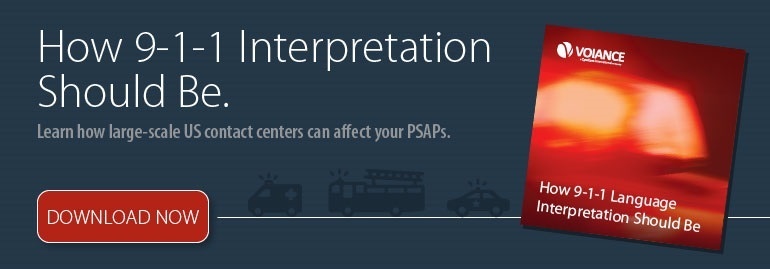Time-to-dispatch to non-English speaking complainants depends heavily on how quickly you can get an interpreter on the phone. That number – the total time from the moment your call taker hears the complaint speaking a non-English language to the moment an interpreter comes on the line – can vary significantly depending on the language services provider you choose. Here are three key questions to ask to make sure your multilingual support partner can meet the needs unique to PSAPs and public safety:
1. Does the language services provider prioritize emergency calls?
When your 9-1-1 call takers call for an interpreter, where does their call land in the queue? Does the language services provider place them at the end of the line or recognize the emergency nature of the call and prioritize it accordingly?
At Voiance, 9-1-1 calls receive priority queuing. We place them at the front of the line, ahead of calls from non-emergency clients, because we recognize that these calls require immediate action. In 2016, we connected emergency calls to interpreters in under three seconds, on average.
2. How streamlined is the call-in process?
How many steps does it take for your call takers to connect to an interpreter? Does the process involve dialing complete phone numbers and extensions, entering credentials on every call, and holding for and conversing with an operator prior to reaching an interpreter?
Voiance connects our clients to interpreters in fewer steps, saving time on every call. Dial in, let our system auto-authenticate you, and select your language. We can customize this process to meet your PSAP’s particular needs.
3. Can the provider schedule interpreters to meet demand, minimizing wait times?
Priority queueing and streamlined connections won’t mean much if call takers experience long waits for interpreters due to lack of availability. Does your language services provider monitor call volume levels and schedule interpreters accordingly, especially on nights and weekends when emergency calls increase in frequency?
Voiance uses a large-scale US interpreter contact center model with employee interpreters, enabling us to analyze trends and schedule interpreters to match your PSAP’s needs. Competitors who rely primarily on at-home, independent contractor interpreters cannot lawfully require them to work particular hours, and this may leave gaps on nights and weekends.
Now that you understand how much multilingual support can vary from provider to provider, and the critical difference these variables can make for PSAPs and public safety, download our ebook to learn more about How 9-1-1 Interpretation Should Be.

